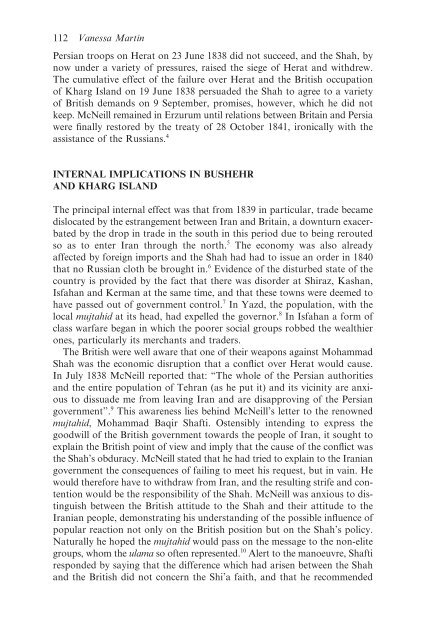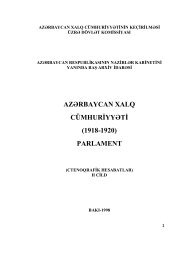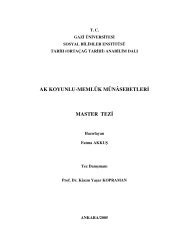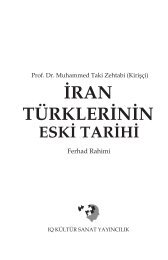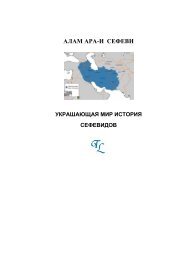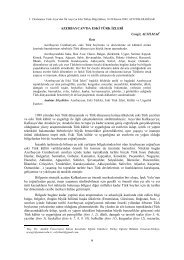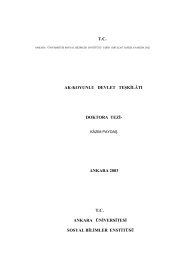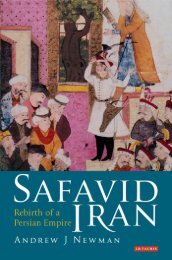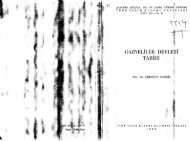War and Peace in Qajar Persia: Implications Past and ... - Oguzlar.az
War and Peace in Qajar Persia: Implications Past and ... - Oguzlar.az
War and Peace in Qajar Persia: Implications Past and ... - Oguzlar.az
- No tags were found...
Create successful ePaper yourself
Turn your PDF publications into a flip-book with our unique Google optimized e-Paper software.
112 Vanessa Mart<strong>in</strong><strong>Persia</strong>n troops on Herat on 23 June 1838 did not succeed, <strong>and</strong> the Shah, bynow under a variety of pressures, raised the siege of Herat <strong>and</strong> withdrew.The cumulative effect of the failure over Herat <strong>and</strong> the British occupationof Kharg Isl<strong>and</strong> on 19 June 1838 persuaded the Shah to agree to a varietyof British dem<strong>and</strong>s on 9 September, promises, however, which he did notkeep. McNeill rema<strong>in</strong>ed <strong>in</strong> Erzurum until relations between Brita<strong>in</strong> <strong>and</strong> <strong>Persia</strong>were f<strong>in</strong>ally restored by the treaty of 28 October 1841, ironically with theassistance of the Russians. 4INTERNAL IMPLICATIONS IN BUSHEHRAND KHARG ISLANDThe pr<strong>in</strong>cipal <strong>in</strong>ternal effect was that from 1839 <strong>in</strong> particular, trade becamedislocated by the estrangement between Iran <strong>and</strong> Brita<strong>in</strong>, a downturn exacerbatedby the drop <strong>in</strong> trade <strong>in</strong> the south <strong>in</strong> this period due to be<strong>in</strong>g reroutedso as to enter Iran through the north. 5 The economy was also alreadyaffected by foreign imports <strong>and</strong> the Shah had had to issue an order <strong>in</strong> 1840that no Russian cloth be brought <strong>in</strong>. 6 Evidence of the disturbed state of thecountry is provided by the fact that there was disorder at Shir<strong>az</strong>, Kashan,Isfahan <strong>and</strong> Kerman at the same time, <strong>and</strong> that these towns were deemed tohave passed out of government control. 7 In Y<strong>az</strong>d, the population, with thelocal mujtahid at its head, had expelled the governor. 8 In Isfahan a form ofclass warfare began <strong>in</strong> which the poorer social groups robbed the wealthierones, particularly its merchants <strong>and</strong> traders.The British were well aware that one of their weapons aga<strong>in</strong>st MohammadShah was the economic disruption that a conflict over Herat would cause.In July 1838 McNeill reported that: “The whole of the <strong>Persia</strong>n authorities<strong>and</strong> the entire population of Tehran (as he put it) <strong>and</strong> its vic<strong>in</strong>ity are anxiousto dissuade me from leav<strong>in</strong>g Iran <strong>and</strong> are disapprov<strong>in</strong>g of the <strong>Persia</strong>ngovernment”. 9 This awareness lies beh<strong>in</strong>d McNeill’s letter to the renownedmujtahid, Mohammad Baqir Shafti. Ostensibly <strong>in</strong>tend<strong>in</strong>g to express thegoodwill of the British government towards the people of Iran, it sought toexpla<strong>in</strong> the British po<strong>in</strong>t of view <strong>and</strong> imply that the cause of the conflict wasthe Shah’s obduracy. McNeill stated that he had tried to expla<strong>in</strong> to the Iraniangovernment the consequences of fail<strong>in</strong>g to meet his request, but <strong>in</strong> va<strong>in</strong>. Hewould therefore have to withdraw from Iran, <strong>and</strong> the result<strong>in</strong>g strife <strong>and</strong> contentionwould be the responsibility of the Shah. McNeill was anxious to dist<strong>in</strong>guishbetween the British attitude to the Shah <strong>and</strong> their attitude to theIranian people, demonstrat<strong>in</strong>g his underst<strong>and</strong><strong>in</strong>g of the possible <strong>in</strong>fluence ofpopular reaction not only on the British position but on the Shah’s policy.Naturally he hoped the mujtahid would pass on the message to the non-elitegroups, whom the ulama so often represented. 10 Alert to the manoeuvre, Shaftiresponded by say<strong>in</strong>g that the difference which had arisen between the Shah<strong>and</strong> the British did not concern the Shi’a faith, <strong>and</strong> that he recommended


